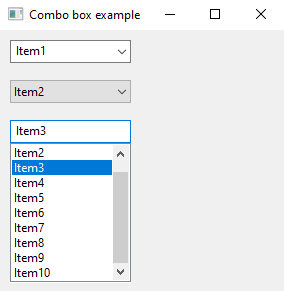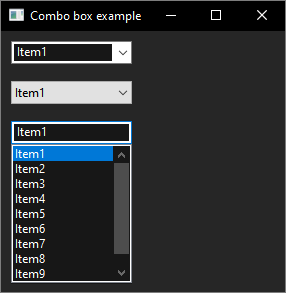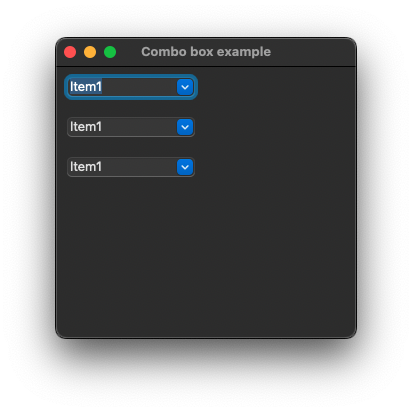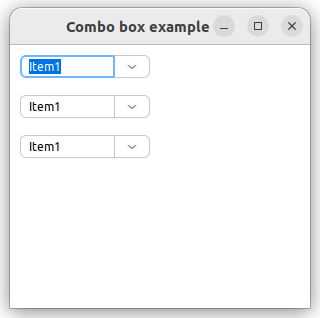combo_box.cpp
demonstrates the use of xtd::forms::combo_box control.
- Windows


- macOS


- Gnome


#include <xtd/forms/application>
#include <xtd/forms/combo_box>
#include <xtd/forms/form>
using namespace xtd;
using namespace xtd::drawing;
using namespace xtd::forms;
namespace combo_box_example {
public:
form1() {
controls().push_back_range({combo_box1, combo_box2, combo_box3});
text("Combo box example");
combo_box1.location({10, 10});
combo_box1.items().push_back_range({"Item1", "Item2", "Item3", "Item4", "Item5", "Item6", "Item7", "Item8", "Item9", "Item10"});
combo_box1.selected_index(0);
combo_box2.location({10, 50});
combo_box2.drop_down_style(combo_box_style::drop_down_list);
combo_box2.items().push_back_range({"Item1", "Item2", "Item3", "Item4", "Item5", "Item6", "Item7", "Item8", "Item9", "Item10"});
combo_box2.selected_index(0);
combo_box2.selected_index_changed += event_handler(*this, &form1::on_combo_box_click);
combo_box3.location({10, 90});
combo_box3.drop_down_style(combo_box_style::simple);
combo_box3.items().push_back_range({"Item1", "Item2", "Item3", "Item4", "Item5", "Item6", "Item7", "Item8", "Item9", "Item10"});
combo_box3.selected_index(0);
combo_box3.selected_index_changed += event_handler(*this, &form1::on_combo_box_click);
}
private:
combo_box1.selected_index(as<combo_box&>(sender).selected_index());
combo_box2.selected_index(as<combo_box&>(sender).selected_index());
combo_box3.selected_index(as<combo_box&>(sender).selected_index());
}
combo_box combo_box1;
combo_box combo_box2;
combo_box combo_box3;
};
}
auto main()->int {
application::run(combo_box_example::form1 {});
}
Generated on Mon Oct 9 2023 14:41:55 for xtd by Gammasoft. All rights reserved.
